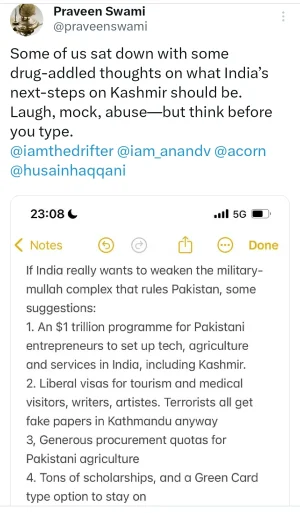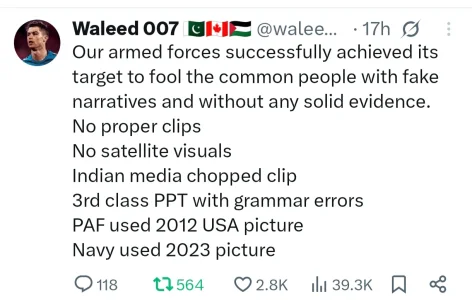Tom Cooper's assessment of this war
What can we conclude from all this?
Well, as you wish. Indeed, if you wish, join the Pakistanis (and outlets like CNN) and celebrate a "victory," as their prime minister announced. Many Indians are no doubt angry because they feel their government "didn't finish the job"—even if it had the chance.
But beware: New Delhi has changed its strategy, and Pakistan must now expect a similar – military – response to any new terrorist attack in India. Pakistani deterrence has failed: in fact, it is now non-existent (especially if the Indians continue to improve their stockpiles of air defense munitions). The fighting has also stopped without Islamabad having at least attempted to resolve the issue of New Delhi's suspension of the Indus Waters Treaty. One may also wonder whether Beijing will rush to compensate Pakistani losses and munitions expenditures: I don't think that is likely, unless "someone" (read: Qatar) pays.
Regarding military matters… Unlike the war in Ukraine, this war was fought primarily with 1990s technology, with some improvements over the 2000s. While both India and Pakistan have “decent” integrated air defense systems (IADS) and have deployed attack drones in large numbers, despite significant improvements over the past 20 years (and especially the past 10), they have deployed heavy and expensive systems based on late 20th-century technology. Aside from some self-imposed constraints (on the Indian side), the generals of both countries are still 10 to 15 years behind. That is why they have not yet fully adapted to the latest developments. Indeed, it is likely that this "detail" contributed precisely to Pakistan's decision not only not to escalate, but to stop: due to insufficient stockpiles, its armed forces were on the verge of running out of the only types of munitions that had proven useful – such as attack drones – "even" in a conflict as brief as this one.
Certainly, Pakistan has made better use of the last few years than India, and not only has it acquired "platforms" (first and foremost aircraft), but it has also improved its electronic warfare capabilities and acquired the software necessary for better integration of its weapons. However, the PAF —like the rest of the Pakistani armed forces—severely lacks long-range ground attack weapons. Despite all their claims and boasts, they have no, or far too few, missiles capable of achieving pinpoint accuracy over a range of 300 to 400 km. Certainly nothing comparable to India's

and SCALP-EGs. Unless Pakistan finds a way to manufacture attack drones similar to Iran's Shaheed, and in large quantities, the situation is unlikely to change anytime soon. In this regard, Pakistan's generals have "missed the boat."
At least the PAF is now capable of conducting "network-centric warfare": it is entirely possible (even likely) that the Pakistani Navy could do the same; only the Pakistani Army is uncertain in this regard. On the contrary, and with the exception of its air defense, India has taken far too little initiative in this regard. The IAF, in particular, is still considerably behind: at present, it is not even clear whether the much-heralded acquisition of secure radios and a system enabling network-centric warfare from Israel has been applied to its entire fleet, or (much more likely) only to a part of its fighter-bomber fleet. That said, once the Indians reset their command and control system and started from scratch—by neutralizing Pakistani air defenses—their conduct of operations improved markedly. Above all, they became professional and remained focused on the essentials, such as neutralizing the PAF air defenses and the PA artillery . When such an operation is carried out in a well-organized manner, positive results are inevitable. In comparison, Pakistani conduct began to degenerate into targeting religious sites (such as Amritsar, with its Sikh holy sites), and making unfounded claims of “destroying S-400s in Adampur” – as if the destruction of a single S-400 SAM system could have completely reversed the situation.
Above all, the intelligence services on both sides failed (and miserably) to learn about major events and report them, while the generals on both sides displayed their usual lack of imagination and inflexible conservatism in planning and conducting operations. No one in India or Pakistan dares to take risks, as doing so could turn out to be a mistake. Unsurprisingly, one thing remains unchanged, and it is already a certainty: in the vocabulary of the Indian armed forces, all this was a "cross-border incident." Not a "war"...
Finally, and most importantly: not only India, but also "the West" might want to – finally – start taking Chinese PR weapons systems much more seriously than they usually do.
That's about it for this "tour"—from me and, I guess, from India and Pakistan too. Thanks for reading all this.
***
ADD-ON in reaction to several related questions: Frankly (as always), I couldn't care less about CNN & Co KG GesmbH AG's PR efforts, New Delhi's insistence that "we are a responsible democracy and therefore cannot proclaim military victories," and even less about Western "military experts."
When one side bombs the other's nuclear weapons storage facilities, and the other has no opportunity to retaliate, then that is a clear victory in my eyes.
In this case: a clear victory for India.
Unsurprisingly, Islamabad has "called" for a "ceasefire".



 and SCALP-EGs. Unless Pakistan finds a way to manufacture attack drones similar to Iran's Shaheed, and in large quantities, the situation is unlikely to change anytime soon. In this regard, Pakistan's generals have "missed the boat."
and SCALP-EGs. Unless Pakistan finds a way to manufacture attack drones similar to Iran's Shaheed, and in large quantities, the situation is unlikely to change anytime soon. In this regard, Pakistan's generals have "missed the boat."




